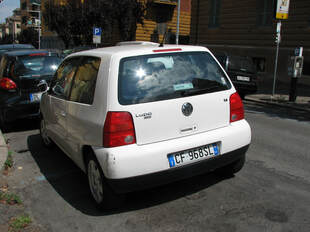 As I was driving down a main road the other day I noticed a distinctive vehicle pull out from a side street. Behind the wheel was one of the priests from my parish. I recognized the vehicle first, and then saw that it was indeed Father. But what grabbed my attention was the expression on his face: he looked happy and content. He was clearly not aware anyone was looking at him, so I have no doubt his expression was authentic. Of course, I know him and therefore I know that he is definitely joyful in his priesthood, but the fact remains that even without ‘doing’ anything other than driving his car, his countenance spoke volumes.* Upon reflection, I realized that something about his expression communicated his interior disposition which uplifted me without him even knowing anything had taken place. Of course, someone who is happy, whoever it may be, is always uplifting. But recognizing this also gave rise to insights into the power contained by our interior attitudes and demeanor, and hence, our presence, even when our encounter is seemingly indirect. Just as Jesus’ very presence elicited faith and hope in the people He met, so too, should our presence be a sign of hope, and in that way, it should glorify God. 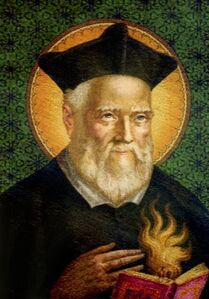 It is not only what we do, but also who we are that should glorify God; that is, people should see Christ in us. This may feel daunting since we know we are prone to sin, but let’s be careful not to think this impossible or that it is too much of a burden to even consider. We must also acknowledge that sometimes we simply do not feel upbeat at all, especially in times of suffering. But if we are sincere and authentic, even in the worst conditions, we can glorify God through our faith and the graces of patience, bearing suffering with dignity, humbly asking for help when we need it, and of course, maintaining our hope in God. Jesus never promised us lives devoid of suffering, but when it does come, it can take on meaning if we unite our suffering to His, offering it as prayer. What Jesus does promise is victory in Heaven, (although it can also happen in certain instances during this life), and we were promised to never be alone in our suffering: He is with us, knowing full well the burden suffering places upon us. We will always need to pray for the graces to bear trial with patience and hope. But in doing so, we are in fact glorifying God by fighting the impulse to let suffering or our need for healing overpower us. Further, we are not meant to be disingenuous in pretending to be cheerful when we are feeling terrible; it is not healthy to be anything other than who we are, as we are. But one can be of ‘good cheer’ authentically, that is, to be filled with joy, even when suffering. This is because good cheer (or gladness) is a disposition of heart: it is about the joy that resides within which arises from loving the Lord and trusting in His care. It is an attitude grounded in hope which indeed glorifies God.  Who we are should be grounded in our relationship to God. It should be obvious to others that we are Christian. This does not mean that wearing a sign such as a crucifix is all we need, but when we do wear one, we should remember it is, in fact, a declaration of what we believe and of Whose we are. What definitively ‘clothes us,’ revealing that we are followers of Christ, is our behavior: it should be apparent that we are His.** This is not to say we must be perfect, (which is actually impossible), but it means we are honest, try to love our neighbor, forgive when we can, be generous as we are able, and ask humbly for forgiveness when we do wrong. The more we glorify God by our actions, the more we grow in love for Him, and therefore find interior peace as we assist in building the Kingdom. This is what it means to clothe ourselves in Christ: as we work at living the Gospel He taught, we grow in the disposition of gladness and joy within our hearts. This leads to gratitude, peace, hope, and greater love of the Lord. 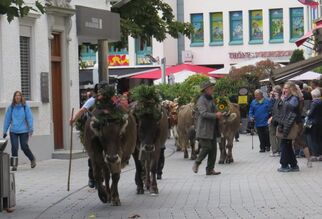 Something we might think of doing is taking up the practice of praying for a ‘stranger’ encountered at some point during the day. In prayer, perhaps before going to bed, pick out a person who crossed your path that day while in a store, at work, school, church, or a service provider or delivery person who came to your home, etc., whose presence touched you or for whom you simply feel inspired to pray. There does not have to be a discernable reason for your choice. Your prayer may make a difference in their life; we simply entrust them to God. This practice can make us more attentive to how we are clothed in Christ and can increase our ability to notice others more sensitively. Being noticed raises the dignity of the ‘other’ from anonymous to brother or sister, and fosters a connection, even if just for a moment. It does not take much to offer God’s love; sometimes a smile is all we need give. Clothing ourselves in Christ, that is, living the Gospel message as His disciples, is how we share love and hope, it is how we can ‘ignite’ our own inner joy, and it also glorifies God. 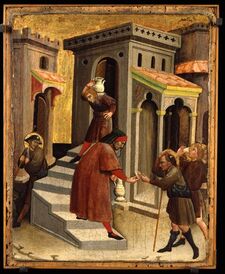 May we clothe ourselves in Christ and offer that clothing to others as Jesus would have us do! May we recognize Jesus in our brothers and sisters who are as yet strangers! And may we find inner gladness and contentment in the love of God by trusting in His promises! Let us continue to meet in the Heart of Jesus! Peace!
* It spoke volumes not just upon the fact that he is a happy person, but his collar and black clerical shirt made it clear to anyone who observed that he is ordained. A happy priest is a great witness to the beauty of the priestly vocation and as such, his happiness is a great ‘advertisement.’ But it also reminds us that we all witnesses to our own vocation in what we do. ** This reminds me of the joke about the person with a bumper sticker on their car that said “Honk if you love Jesus.” Forgetting it was there, the driver got quite angry, making gestures and yelling at all those people who kept honking! Not a great witness, eh?! -Also of note is that I began the thread about being clothed in Christ in my previous entry. Here are some references from the letters of St. Paul: Romans 13:14; 2 Corinthians 5:21; Galatians 3:27 and also Ephesians 5:13-17 in which St. Paul told us to cloth ourselves with spiritual armor against the attacks of the evil one. Images: 1. My photo, a car in Rome, Italy. (Check out the model name of the VW. It is a bit of familial fun for me.) 2. Painting, St. Philip Neri. I chose St. Philip because he was known for his raucous sense of humor and for always being of good cheer even in the midst of his own hardship. In my mind, he is the patron saint of joy. 3. Icon, San Jose Flor de Jese, by Fr. William Hart McNichols. While much is unknown in the life of St. Joseph, it is clear that he was the connection between the promise made to David, son of Jesse, and Jesus. I also love how gentle Joseph appears in this icon; his gesture and his face seem to exude gentleness and reverence. You can obtain a copy of this icon in one of a variety of mediums at https://fineartamerica.com/featured/san-jose-flor-de-jese-william-hart-mcnichols.html. 4. My photo, taken in Vaduz, Liechtenstein. We happened to be in Vaduz at the exact time when the cows are taken "home" from their mountain wanderings for the winter. They are adorned with flowers and large cow bells (which ring quite loudly) as they are paraded through the streets in a celebration of sorts. It is a sight to behold. But I did not chose this for the cows! Rather, it was selected for the people interacting. 5. Painting, Corporal Works of Mercy. Note: In compliance with GDPR rules, I wish to make it clear that I do not gather any information on any of my readers at any time. 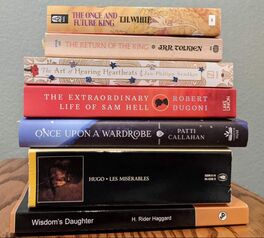 One of my favorite activities is reading a good novel. And yes, reading is definitely an activity. When one immerses in a book fully, the imagination comes alive and our emotions and senses engage. If we let it, a really good novel can transport a person as if through a portal into the world created by the writer. A novel which so transported me is A Gentleman in Moscow * about a Count Rostov who as a young man in 1922 is incarcerated for life in one of the most prestigious hotels in Moscow as a result of his opposition to Communism. While he could have suffered a worse fate, Rostov could never leave the building. He was moved from the luxurious suite in which he had been residing to living quarters that were rather tiny in what amounted to an attic. On the day Count Rostov was moved, he had to choose what to keep in the cramped space, losing the rest to the authorities. Among the items he retained were two bottles of brandy that had belonged to his long deceased father and were therefore precious to him. Later that night, three members of the hotel staff visited to console him. Without hesitation, Rostov opened one of the bottles of brandy, sharing the entire bottle with them. Earlier he had mused that what makes certain possessions dear is that they are “invested with memories” (pg. 14) which in turn makes them difficult to part with; and yet for a man who had just lost so much, he was able to offer the brandy as if he was inviting them into the beauty of his remembrances, finding freedom and joy in this ‘prized possession’ now poured out. In doing so, he had actually not decreased the precious brandy, but rather, he increased it, because in this simple gesture of sharing his unspoken memories with them, they had all created a new memory which then gave birth to the priceless intimacy of deep friendship that grew throughout the years. 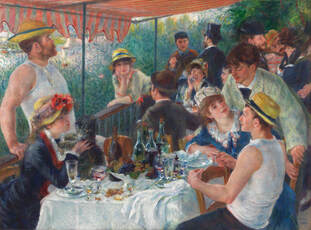 This passage inspired me to reflect upon that which we hold valuable and what makes it so. Material things can evoke precious, joyful memories as well as difficult, painful lessons now valuable because we learned from them. And of course, the important people in our lives often do the same. It is in the intimacy of sharing with them that friendship blossoms; 'wisdom is doubled and pain is halved' when shared with our loved ones. In turn, this gave rise to another important question: what do we invest in our spiritual memories? In other words, has there been something special which we actively value that occurred through receiving a Sacrament, hearing a particular homily, praying privately, reading a passage of Scripture, or perhaps an interaction with someone that evoked a sense of the presence of God? What memories are invested in these experiences that make them precious? We all have these, but often we do not revisit them, thus diminishing the impact that they have on us now. Our memory can serve as an aid to remind us of graces received which either helped during times of challenge, or simply came as gift from God. Additionally, when we share our faith with another, we do indeed increase it just as Rostov did with his treasured brandy, discovering that the time of sharing becomes a new memory made which is more valuable than any material thing. 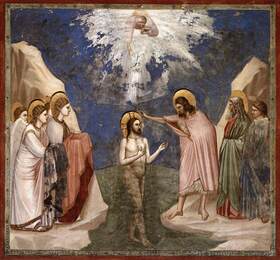 This weekend the Christmas season concluded and now Ordinary Time has begun. Perhaps we can take this seasonal beginning as an opportunity to commit ourselves to praying with the Scriptures more regularly. Doing so would enable our entrance into the wealth of ‘invested memories’ shared by the writers who came before us. We can learn from our biblical ancestor's mistakes, revel in their victories, and more easily recognize the mercy and love of God which is always with His people. And of course, we can delve more fully into the gospel message of Jesus so that we might better incorporate it into our own word and deed.** It is important when reading Scripture (or spiritual readings from a saint, other spiritual writers, or yes, sometimes even a novel), that we enter into it not just with our heads, but with our hearts. In this prayerful reading, our desire should be to “put on Christ” (Romans 13:14; Col. 3:10) that we might in turn offer what is most precious to us, our faith, as we share our time, talent, and treasure with our brothers and sisters.  As mentioned previously, the limitations on the world in which Rostov lived were profound. But in sharing so much with his friends, he was able to actually ‘expand his borders’ through interior freedom; that is, what should have confined him, did not. This is also the wisdom of our spiritual life: there are many different constraints upon us, all of which arise from being broken in a broken world. But with the grace of God, especially in the Sacraments and the Word, we are not at all confined or limited spiritually. Our ability to grow in holiness is a clear sign that there are no constraints to spiritual progress that cannot be overcome with God’s grace. This does not imply that life is easy, but when we recognize what we have been given, our valued loved ones, and our sacred memories, we become even more receptive of God’s actions within our lives, which in turn leads to gratitude… and gratitude begets joy. 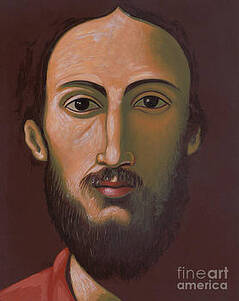 May we spend time prayerfully reflecting upon what is valuable to us and why, and thus be moved to gratitude! May we immerse in our ‘invested memories’ of the Lord and His goodness! And may we grow in freedom, gratitude, and joy, as we work within the limitations life puts upon us, knowing that with the love and mercy of God we are indeed free! Let us meet in the Heart of Jesus! Peace! ©Michele L. Catanese *The novel on which this entry is based is A Gentleman in Moscow by Amor Towles. **It would be good to read actively, that is, to prayerfully enter into each passage of Scripture, allowing the imagination to flow and the senses and emotions to become engaged. No matter which part of the Bible we are reading, we can imagine how the place looked, what it felt like, (the physical environment), the smells, the people and their appearance, and even what something might have tasted like. For example, there is a great description of the manna in the desert during the exodus; what it tasted like is described in detail. (Exodus 16:31) If we are reading a Psalm or a New Testament letter, we can imagine the circumstances behind it, let the imagery or wisdom involved spark thoughts within us, and then respond in prayer. Images: 1. My photo of some of my favorite novels. 2. Oil painting, Luncheon of the Boating Party by Auguste Renoir. You can find more on this at www.phillipscollection.org/collection/luncheon-boating-party 3. Fresco painting, The Baptism of Jesus by Giotto. I saw the original among his other great works on the walls of the Scrovegni Chapel in Padua, Italy. (Chosen in honor of the Feast of the Baptism of the Lord which was this past Sunday.) 4. My photo, the sky, taken in New Mexico just outside Albuquerque. 5. Image, Jesus After Jose Ribera, by Fr. William Hart McNichols. You can obtain a copy in one of many mediums at https://fineartamerica.com/featured/jesus-after-jose-ribera-321-william-hart-mcnichols.html Note: In compliance with GDPR rules, I wish to make it clear that I do not gather any information on any of my readers at any time. |
Heart Speaks to Heart
|

 RSS Feed
RSS Feed

